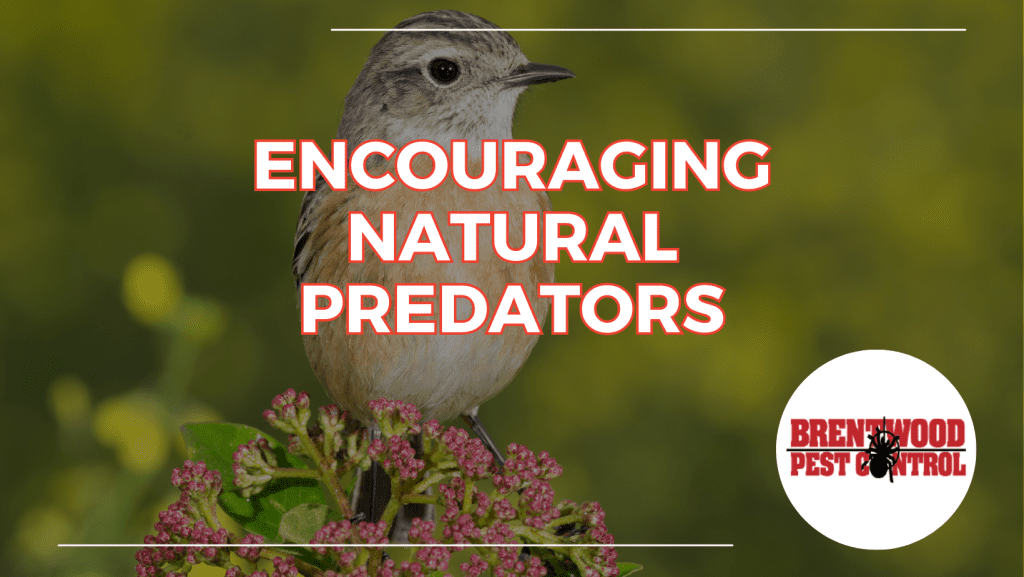
A thriving garden is a joy to behold, bursting with vibrant colors and rich with the bounty of nature. However, maintaining this beauty can be challenging when pests threaten to take over. At Brentwood Pest Control, we understand the importance of balancing pest control with environmental stewardship. One of the most effective and eco-friendly methods of managing garden pests is to encourage natural predators to take residence in your yard. These beneficial creatures can significantly reduce pest populations, ensuring your garden remains healthy and beautiful without the need for harmful chemicals.
The Benefits of Natural Predators
Natural predators, such as birds, beneficial insects, and small mammals, play a crucial role in maintaining the health of your garden. By preying on common garden pests, they help to keep pest populations under control, reducing the need for chemical interventions. This not only helps to protect the environment but also promotes a healthier, more balanced ecosystem in your garden.
1. Reduced Chemical Use
Using natural predators reduces the reliance on chemical pesticides, which can harm beneficial insects and contaminate the soil and water. This promotes a safer environment for your family, pets, and the local wildlife.
2. Sustainable Pest Control
Natural predators provide a sustainable form of pest control. Once established, these beneficial creatures will continue to manage pest populations year after year, making your garden more resilient to pest outbreaks.
3. Biodiversity
Encouraging natural predators increases biodiversity in your garden. A diverse ecosystem is more stable and can better withstand environmental changes and pest invasions.
Attracting Natural Predators to Your Garden
Creating an environment that attracts and supports natural predators involves a few key steps. Here’s how you can make your garden a haven for these beneficial creatures:
1. Planting for Natural Enemies
Different plants attract different types of wildlife. By planting a diverse range of native plants, you can provide food and habitats for a variety of natural predators. Here are some tips:
– Flowering Native Plants: Many predators and parasitoids rely on nectar and pollen. Plants like yarrow (Achillea millefolium), asters (Symphyotrichum spp.), and goldenrod (Solidago canadensis) are excellent choices.
– Diverse Plant Families: A variety of plant families can support a wide range of beneficial insects. This diversity can help prevent pest outbreaks and ensure that flowers are blooming throughout the growing season.
– Various Sizes and Shapes: Different predators have different habitat needs. Include plants of varying sizes and shapes to create a range of microhabitats. Perennials are particularly useful as they provide long-lasting shelter.
2. Providing Water Sources
All wildlife needs water. Installing a small pond, birdbath, or even a shallow dish can provide a valuable water source for natural predators. Ensure that the water is fresh and regularly cleaned to prevent it from becoming a breeding ground for mosquitoes.
3. Creating Shelter and Nesting Sites
Birds, beneficial insects, and small mammals need places to hide from predators and harsh weather. Here’s how to create shelter:
– Birdhouses and Bat Boxes: These provide nesting sites for birds and bats, both of which are excellent at controlling pests.
– Logs and Leaf Litter: Leaving some areas of your garden undisturbed with logs, rocks, and leaf litter can provide shelter for ground-dwelling predators like beetles and spiders.
Identifying and Protecting Natural Predators
Understanding and recognizing the natural predators in your garden can help you protect and encourage their populations.
– Lady Beetles: These well-known predators consume aphids, scale insects, and mites. They are easily recognizable by their distinctive spots.
– Lacewings: Both larvae and adults feed on a variety of soft-bodied pests. Lacewings are attracted to pollen and nectar, so flowering plants are a great way to encourage them.
– Birds: Many bird species, such as bluebirds and wrens, feed on insects. Installing bird feeders and nesting boxes can attract these helpful allies.
– Spiders: Often overlooked, spiders are voracious predators of many garden pests. They are beneficial to have in any garden ecosystem.
Avoiding Pesticide Use
To protect the natural predators in your garden, it is crucial to avoid using pesticides. Pesticides can harm or kill beneficial insects and disrupt the natural balance. Even organic pesticides should be used sparingly, as they can still negatively impact beneficial insect populations.
Supporting a Healthy Garden Ecosystem
Encouraging natural predators is about more than just controlling pests; it’s about creating a balanced and healthy ecosystem. Here are some additional tips to support your garden’s health:
– Composting: Use compost to enrich your soil and improve plant health. Healthy plants are less susceptible to pest infestations.
– Crop Rotation: Rotating crops can help prevent pest populations from becoming established.
– Companion Planting: Some plants can help deter pests or attract beneficial insects when planted together.
Encouraging natural predators in your garden is a smart, eco-friendly approach to pest control. By planting native plants, providing water sources, creating shelters, and avoiding pesticides, you can attract and support a diverse range of beneficial creatures. This helps keep pest populations under control and promotes a healthier, more vibrant garden ecosystem.
For more information on organic pest control methods and how to encourage natural predators in your yard, visit our website. Call Brentwood Pest Control at (615) 417-1243 if you need further support or professional pest control services. Our team of experts is here to help you create a pest-free, healthy garden environment.
